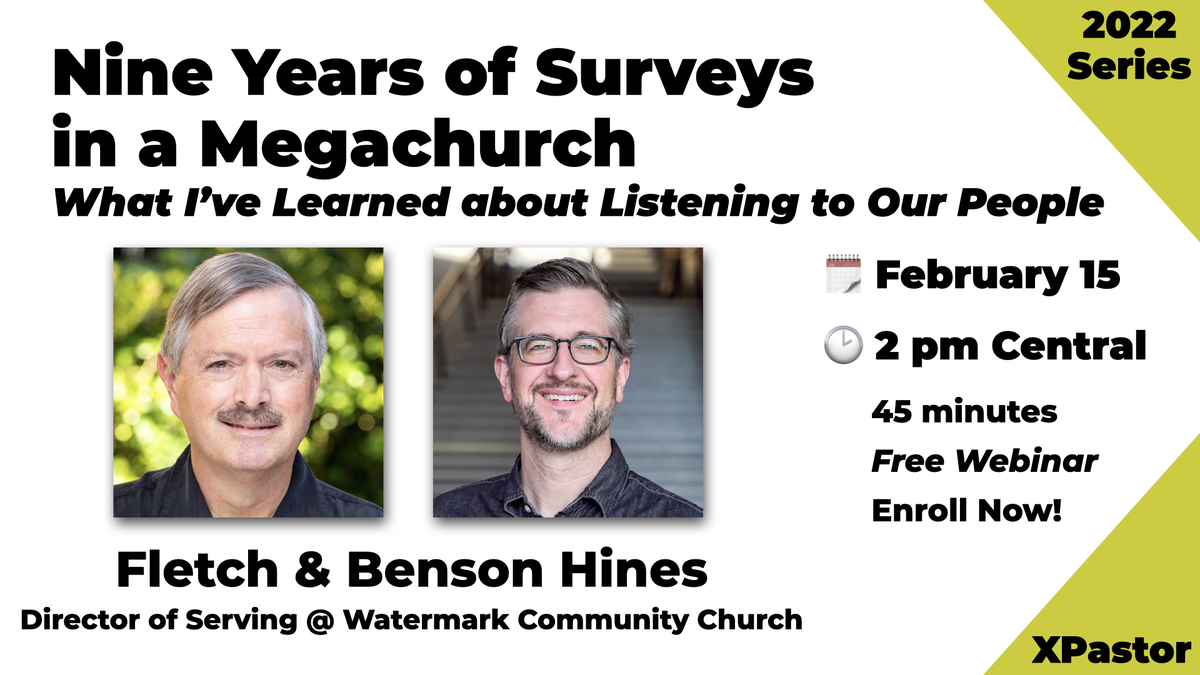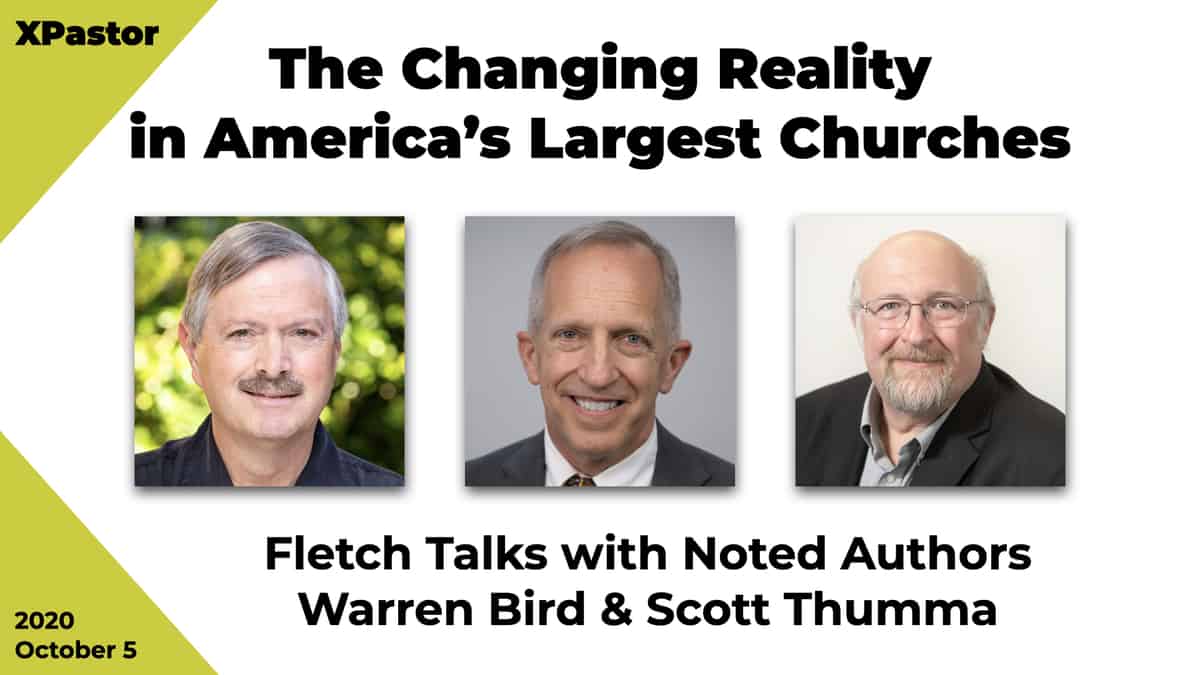Why are people leaving your church? Every church has a back door. But do you know why they are leaving? Have you ever done exit interviews? A number of years ago, Bill Hendricks wrote a book entitled Exit Interviews. It was a fantastic piece on the reasons that people might leave your church. His book is now out of print but Bill has given us permission to post two vital chapters from his book—Chapter 1—“The Back Door” and Chapter 20—“What Churches Can Do.” A PDF of the excerpt can be found below, as well as the footnotes that have been removed on this post.
Chapter 1—The Back Door
I used to go with the multitude, leading the procession to the house of God, with shouts of joy and thanksgiving among the festive throng. Why are you downcast, O my soul? Why so disturbed within me? (Psa. 42:4-5)
When I was a boy, my family belonged to a small independent church in Dallas, Texas. The dozen or so families that started the church put up a standard A-frame sanctuary and tacked a shotgun wing on the western end of it for Sunday school. After church on Sundays and prayer meetings on Wednesdays, everyone ended up mingling in the lobby between the sanctuary and the classrooms (only they didn’t call it a lobby; they had a church-word for it, the vestibule).
As a boy, though, I wasn’t a mingler; I was a carouser, a frolicker, a mischief-maker (some would say a terror). So it was that my pals and I often took off into the field to the west of the building, which brought us around to the back door of the Sunday school wing.
And there we’d always find him, a man I’ll call Mr. Walker. What fixes him in my memory was that he always seemed to be out the back door of the church, puffing on a cigarette.
Mr. Walker was lean and tall—at least he would have been tall if he hadn’t been stoop shouldered. Maybe he was born with a bent back; maybe he was wounded in the war. But I wonder if he hadn’t ruined his posture through his habit of bending over to light his smokes and then holding them in his hand rather than his mouth, so that he dipped his head whenever he took a drag.
It was a lonely spot for Mr. Walker. Everyone else was up in that vestibule, talking about whatever people in Dallas talked about in 1961. But he’d be out back in the Texas sun with his Camels, an occasional jackrabbit, and a gang of seven-year-old boys tearing by in search of adventure.
I wonder why he bothered to come to church? If he wanted privacy, he could have had it at home, or in a park, or on a golf course. If he wanted friendship (or fellowship), he wasn’t making much effort to find it; though amiable, he said very little, joined no committees, and mostly kept to himself. What was it, then, that kept him coming to church rather than go someplace else?
Only Mr. Walker could tell us for sure, and he’s gone—yes, the smoking finally got him. But looking back, I feel certain that he showed up week after week for only one reason: he wanted to get near God and he figured church was the place to do it. I don’t think he enjoyed his nicotine habit. He turned away when he bowed his head to inhale. I don’t say he was ashamed of himself, but he was alienated by his addiction. Nevertheless, he brought himself—smoking and all—to a place that stood for God. He wanted to be with God. And now he is (I believe).
Fast-forward with me three decades later to 1993. A great deal of noise is now being made about what’s going on at the “front door” of the church—not the church in which I grew up, but The Church, the universal church, the body of Christ. If you picture the church as a building (never a good thing to do), the front door represents one’s entry into the faith, the moment of salvation or conversion or, as many put it, of being “born again.”
A lot is happening today to get people near, if not through, the front door of the church, to get them saved—or at least “churched,” as the jargon now goes. In North America, both conservative and mainline churches are taking aggressive steps to recruit new members. The Episcopal Church has gone so far as to call the 1990s the Decade of Evangelism. Likewise, the Presbyterian Church (U.S.A.) has targeted evangelism and church development as its priority goals for this decade. Similar objectives have been set by other groups.
This new evangelistic fervor hopes to catch a perceived wave of renewed interest in religion now sweeping the land. If one believes the popular press, the United States is undergoing a virtual revival, led by Baby Boomers returning to the church. (Later we’ll examine the extent to which those reports are valid. But for now, let’s assume they are true.)
One survey even suggested that faith in God is now the most important thing in Americans’ lives, followed by good health and a happy marriage—an “astounding” result in the opinion of one sociologist, representing nothing less than a “cultural shift.” “The Age of the Yuppie is dying,” trumpeted the Associated Press.
As I say, a lot of noise is being made about what’s going on at the “front door” of the church. But hearing it all, I wonder: what’s going on around back? Not to take anything away from evangelistic outreach or attempts to make the church’s programs more “relevant” to a contemporary generation. By no means!
But I’ve known this building all my life, and I’m still a bit mischievous and contrary. So while others may celebrate newcomers in the vestibule, my instinct is to take off for adventures out back. And what do I find at the rear of the church? Something very different from the days of my youth. Instead of a solitary figure or two like Mr. Walker, I find quite a few people—leaving! It hardly makes sense. While countless “unchurched” people are flocking in the front door of the church, a steady stream of the “churched” is flowing quietly out the back.
Moreover, talking with people who are still inside the church—especially some of the old-timers who have been in the faith for a while—I find that a growing number have lost the energy and enthusiasm they once had for programs of spiritual development such as worship services, discipleship groups, prayer meetings, Bible studies, and so on.
This “dark side” of church growth is not something that has been either widely reported or carefully studied. But it’s there. In fact, I believe it is growing. Despite glowing reports of surging church attendance, more and more Christians in North America are feeling disillusioned with the church and other formal, institutional expressions of Christianity.
That’s not to say that these “back-door believers” have given up on the faith. On the contrary, they may be quite articulate regarding spiritual matters. Indeed, some have remarkably vibrant spiritual lives and touchingly close friendships with a kindred spirit or two. But in the main, they tend to nurture their relationship with God apart from the traditional means of church and parachurch.
“Impossible!” some will reply. “One simply cannot grow as a Christian unless one is part of a church, a local body of believers.” So conventional wisdom would have it. But as we’ll see, many who are leaving churches have given up on conventional wisdom. There was a time when they participated in a faith community for all the reasons given for participation: worship, instruction, fellowship, service, community, accountability, and so on. But now, for a variety of reasons, they look elsewhere to meet those needs.
Actually, the issue is not really church attendance, though I don’t want to discount what “going to church” means—or is supposed to mean—for Christians. The issue is something toward which church attendance points—the nature of spirituality in a deeply secular age. Bill Moyers describes it well: “The search for meaning is the most stubborn trait of humanity. … The real story
This book attempts to tell part of that story. If significant numbers of Christians are growing disillusioned with churches and ministries, if they are looking elsewhere to meet their deepest spiritual needs, then someone ought to examine that. Someone needs to ask, What’s going on here?
Of course, the best people to ask are disillusioned Christians themselves. That’s why this is a book of interviews, a collection of stories told by individual believers about their experience in the faith. That is the most direct way to gain understanding. I agree wholeheartedly with Boston College professor William Kirk Kilpatrick that we not only need stories in our lives, but that life is a story, that the best way to interpret and explain a life is in a narrative way.
However, this book does not pretend to tell the whole story. Indeed, it cannot. Were we to talk with two dozen other believers, we would hear different accounts. Yet always we would come back to that larger story of which Bill Moyers speaks—of people searching for what it means to be spiritual today. The search, or journey, that my interviewees are on has led them outside the programs and away from the structures. That’s because they didn’t find what they were looking for or what they expected in the communities of faith of which they were a part.
But is it really necessary to dwell on this subject? Sure, there may be disaffected people in the church. There may be problems. But what? Hasn’t that always been the case? And won’t it always be? Why dredge up something that puts a negative face on Christianity? As believers, shouldn’t we dwell on the positive, on the edifying things that God is doing among and through His people?
Yes, but the questions assume that nothing edifying is taking place, when in many cases that’s exactly what is happening: God is doing His marvelous work in someone’s life, even apart from the church—believe it or not. I don’t want to be accused of implying that believers don’t need churches. They certainly do. And in fact, none of the people with whom I spoke wanted to do away with the church or parachurch. But like most of us, they found themselves in the gap between the ideals of the New Testament and the realities of actual groups of Christians. After languishing for a while where they were, they chose to get out and find a better way. Less than ideal? You bet.
As for edification, I believe their stories stand to help the body far more than hinder it. After all, God always wants us to deal with reality. He tells us to consider “whatever is true.” Truth may be positive or negative, we may like it or dislike it, but whatever the case we need to face it squarely. Otherwise we walk in darkness, as unwise people.
So if many of those who traditionally have been among the churches’ most loyal members are now turning elsewhere to meet their spiritual needs, that ought to give all believers pause for reflection. That’s a truth that we dare not ignore or deny.
Perhaps I can illustrate why by changing my metaphor of the church from a building to a business (again, not the best thing to do; the church is not a business, and evangelism is more than marketing; nevertheless, churches ignore the principles of business and marketing to their peril).
It is not enough for the church to attract new “customers.” It must also hold onto the ones it has. Why? Because that’s the purpose of the church—people development. The church exists “to prepare God’s people for works of service, so that the body of Christ may be built up until we all reach unity in the faith and in the knowledge of the Son of God and become mature, attaining to the whole measure of the fullness of Christ.
In other words, attracting new customers (outreach and evangelism) is vital, but to use sales guru Carl Sewell’s term, the church is also in business to cultivate customers for life (discipleship and spiritual maturity). The loss of even one previously satisfied customer is worth examining, because it suggests a breakdown somewhere, a disappointment of expectations. Such an examination, painful as it may be, might hold crucial clues as to how the church can improve its core business of bringing every believer to maturity in Christ.
But let’s return from analogy to reality. The church is neither a building nor a business, but a body—the body of Christ. We are members one of another. The tragedy is that in most cases when people put distance between themselves and the body, no one bothers to find out why. Dr. John Savage of L.E.A.D. Consultants has studied the problem of “dropouts” and advised churches in this area for more than seventeen years. In 1973 he studied the dropout patterns of four congregations, each with between 400 and 800 members.
Dr. Savage found an interesting phenomenon. After someone decides to stop attending church, she typically waits for about six to eight weeks to see if anyone will come visit her to find out why she has left. She stays in a sort of “holding pattern,” not reinvesting time or energy in other areas but waiting to see how her former church will respond. If no one contacts her, she eventually crosses off her old church and looks for other options.
What stunned me in Dr. Savage’s research was the finding that 100 percent of the inactive members he interviewed said that no one had ever come to visit them! They had just been ignored and even viewed by some with the attitude “Good riddance!” One person told him, “I have not been active in my church for ten years, and no one has ever asked me why.”
That statement stops me in my tracks. We have churches and denominations today literally doing whatever it takes to attract “unchurched” people to the front door of the faith. Meanwhile, people who have been in the program for years can slip out the back for a variety of reasons and go six or eight weeks—or even ten years—without so much as a phone call or a visit. Surely, then, a book like this one, that gives voice to a few of those “back-door believers,” is not uncalled for.
No, if the church is a body, then we owe it to the disillusioned member—we owe it to him or her—to listen. To really listen. Scripture exhorts us to “mourn with those who mourn,” and many of those who leave churches feel a sense of mourning. Disillusionment involves a grief process, a struggle with feelings of loss. So if we ignore or abandon someone in that condition, we violate the explicit teaching of the New Testament.
Yet people who leave churches are rarely listened to. Instead they are preached at and, frequently, judged. Not that there are many resources that deal with these issues. But of the few that do, many seem to blame the person for whatever problems exist: “If only you would be more forgiving.” “If only you would adopt a different perspective.” “If only you would be more submissive.” “If only you would quit your bellyaching.”
“If only …” Messages like these do little to fulfill the church’s mission to “build people up” in the faith. Instead, since they are at heart messages of condemnation rather than compassion, and of legalism rather than grace, they tear people down and eventually drive them away. Not all churches communicate that. And not all Christians are disillusioned. But many believers choose to go it alone rather than subject themselves to a community of Pharisees.
You may wonder how I came to write this book. I’m not an ordained minister. I don’t lead a parachurch organization. I’m not lobbying for a cause or raising money or starting some sort of “recovery” outreach to ex-Christians. Nor do I have a personal ax to grind. The short answer, and perhaps the best, is that the issue of “what it means today to be spiritual” is one that I’ve been personally involved with all my life.
At four-and-a-half I prayed a prayer to Jesus for salvation. I knew exactly what I was doing—with a four-year-old’s faith, to be sure, and a four-year-old’s understanding. But the gospel as it was explained to me made sense, and I took it. I’m convinced that my conversion was genuine, as evidenced by the fact that my childlike faith took root and flourished and, along with mind and body, grew into adult form.
Have I ever thought seriously of turning away from the faith? I certainly have. Yet here I am. However, in the past several years, for whatever reason, I’ve heard person after person express private doubts about his own spirituality. Not doubts about the basic truths of the faith—the deity of Christ, the resurrection, the existence of God, and so on—but doubts about the various programs put forth for living out that gospel in this crazy world of ours. Christianity is true; they remain convinced of that. But how does one make it work?
I’d been clipping articles and jotting down thoughts on these matters for a number of years when I was asked whether I’d consider writing a book of interviews with “disillusioned Christians.” Things took off from there.
I had no trouble finding people to interview. Virtually everyone to whom I mentioned the project knew immediately what I was talking about, and easily half of them said either, “Boy, you should interview me!” or else, “I know just the person you should talk to!” I thought that was pretty significant. It suggested that I was dealing with something that lies close to the surface, an experience that must be fairly common.
I approached this issue more from a journalist’s perspective than a sociologist’s. I have not worked with a scientific sample or a demographic cross-section of the church, so my findings and conclusions ought not to be construed as definitive. But then, my purpose is not to provide the last word on this subject. I’m satisfied to provide any word on it—that is, to create a vehicle for discussion, reaction, and, hopefully, insight.
I should warn any readers who have picked up this book in hopes of finding juicy tidbits of gossip that you will be disappointed. This is not an expose. There’s a time, a place, and a way to bring sin and evil to light, but that is not my purpose here.
Nor was it the motive of the people who were courageous enough to sit down with a total stranger and talk about one of the most personal things one can talk about—their relationship with God. Each one agreed to an interview on the condition that I would protect his or her identity and privacy and the privacy of those around him or her.
Nevertheless, I will not be surprised if readers approach me insisting that I have interviewed one of their acquaintances. I almost anticipate it, because, as I’ve suggested, virtually every believer either has or knows someone who has a story like one of my interviewees. Look carefully and you may find that disillusioned Christians are among your friends, your neighbors, your coworkers, your fellow churchgoers—even your own family. Perhaps that even describes you.
You can find out by reading the next section, which contains about two dozen “exit interviews” with people who have left the church. Following that I have added a handful of interpretive chapters that look at these conversations in light of the context in which the church finds itself today. I’ve also included a chapter on what I think these stories are saying to churches and church leaders. And finally I’ve offered a word to anyone who identifies with the people in this book.
The thing to keep in mind is that every life is a story. “If you are not looking at life poetically and dramatically, then you are not looking at it properly. And this, it seems to me, is also the way Christianity instructs us to look at life. After all, Christianity has come to us as a story, not as a theory or a philosophy or a science. … Despite the spirit of the age, we feel there must be a point to our lives. One of the great services which a story may render then is to help us see what that point may be. Stories may help us to recognize a moral or spiritual meaning in a personal situation that might otherwise seem chaotic or pointless. ”
See if that is not the case with the revealing stories that follow of everyday people who have decided to leave the church.
Chapter 20—What Churches Can Do
As I was about to cross the stream the usual sign was given to me, that sign which always forbids, but never bids. ~Socrates
I come to a chapter that I would be just as happy not to write. Personally I would be satisfied to let these interviews stand on their own and let readers make of them what they will. But that would be irresponsible. Pascal said that everything that is written merely to please the author is worthless. So, having provided an “open microphone” to people leaving the church, I feel an obligation to say a few words to and on behalf of the church they are leaving.
In doing so, let me remind the reader that I am a layperson. That’s been a tremendous advantage in gathering material for this book. Likewise it affords me some objectivity in making suggestions for how the church might improve its level of services. Of course, it also means that pastors and others who actually deliver those services day in and day out know a lot more about how to do that than I.
But the stories in this book can help them do their job better. In effect, I’ve written sixteen case studies of disillusioned Christians. Even if one dispensed with the rest of what I have to say in this chapter, that would still leave the statements themselves as useful tools for reflection, discussion, and evaluation. I would be delighted if church leaders used the material in those ways. After all, those are the words of the “customer;” therefore, those are the words that matter.
But now let me add some words of my own, beginning with some words of explanation. Throughout this book, I’ve used the word “church” in a variety of ways. What exactly do I mean? Keeping in mind that I am not a theologian and that this is not the place for a full-blown ecclesiology, as well as my disclaimer from chapter 18—that it is difficult anymore to say anything intelligent about the church—one way to describe my understanding would be to say that I hold a “high” view of the church as universal and organic and a “low” view of the church as local and institutional.
The church is universal and organic in that it comprises all believers in Jesus Christ. Thus I adhere to what the major orthodox creeds describe as the “holy catholic church.” That means that whenever I meet someone who is a follower of Christ, I am dealing with a fellow member of the church, a fellow Christian. We stand in relationship to each other because of our relationship to Christ. Together with all other Christ-followers, we make up the body of Christ, the universal body of believers that Christ committed Himself to building.
As a practical matter, however, it is not enough to talk about the church as an amorphous body of believers everywhere; one needs to relate to actual believers somewhere. That sounds easy enough, but over the centuries we Christians have made it complex. Jesus said He would be present when even two or three of His people gather together in His name. But the greater the number of believers gathered together and the more they wish to accomplish, the greater the need and urge for organization and structure. Thus we have inherited and created the vast institutions of Christendom.
There is nothing intrinsically wrong with institutions. But how easily they become the enemy of spiritual life! In some cases we even have ecclesiastical structures with no spiritual life. I view structure as a means to an end, not the end itself. There is nothing sacred about structure. It is always negotiable. It varies from culture to culture. As a result, God gives us great latitude in how we set up churches and how we “do church.” (At least we should hope that He does, given the incredible variety today of churches and their related organizations!)
In that spirit of flexibility, I believe God wants Christians to gather together for purposes of worship, instruction, fellowship, service, community, accountability, mission and evangelism, and whatever else brings glory to Him, meets the needs of the body, and proclaims Christ to the world. Christians do that through a variety of structures. The most common among them is the “local church.”
I think it is crucial to observe that the distinction between the “universal church” and the “local church” is purely our own. The terms do not appear in the New Testament. This does not invalidate the idea of the local church. As I say, believers need to relate to and be committed to other believers somewhere, and the reality is that most will end up (and probably should end up) in what has been described as a “local” congregation.
But I do object to the preeminence that many local churches assume for themselves by declaring that they are God’s ordained and primary means of helping people grow spiritually. That strikes me as an overstatement. Churches certainly ought to be means for the development of people’s spiritual lives, as I have stated repeatedly. But one is on thin ice to insist that local churches enjoy a role of institutional superiority, especially when no one can define with precision what a local church is, given that there is no term for it in Scripture.
To be honest, the question of what is a local church and what is its authority is a battle I have no interest in fighting. Every pastor, church leader, and layperson reading this chapter probably has his or her own convictions on these matters, and I’m satisfied to leave those unchallenged. But I cannot completely avoid the issue, because it bears directly on the subject of this book. It is from local churches, after all, that many of my interviewees and countless others like them have disassociated themselves.
The question for many readers is, were they wrong to do so? And are they outside God’s will if they remain apart from a local congregation? And can they grow spiritually on their own? How one answers depends largely on whether one holds a high or low view of the local church. The high view would tend to see church dropouts as being in grievous error. The low view would tend to back away from any fast judgments.
For my own part, I view people who leave churches but do not leave the faith as continuing members of the universal body of Christ. I think it is very possible, though neither preferable nor easy, to grow in the faith apart from an organized local church. But it is virtually impossible to grow without at least some relationships with other believers in which life in Christ is celebrated.
For that reason, we need the local church. And we especially need pastors, because we have explicit New Testament teaching on the role of pastors in developing spiritually mature people. I believe that pastoring a church may be the toughest job in the world today. I know many people who do it well, some extremely well. I know none for whom the work is easy.
This book illustrates one reason why. On the one hand, the pastor is expected to attract new people to the faith and to the church. On the other, he is expected to meet the needs of regular attenders.
Attracting new customers and holding onto old ones are extraordinarily different tasks, especially for the church. These are two distinct groups of people, with very different needs, or at least with different approaches to meeting their needs. Reaching out to the unsaved and the unchurched while at the same time meeting the needs and satisfying the demands of people who have been in the program for a while taxes the skills of pastors and church leaders beyond imagining. In fact, some churches have decided to concentrate on one group or the other, but not both, because to try and meet the needs of both is just too much.
Now along comes Exit Interviews, raising the issue of disgruntled people who are leaving. If I were a pastor, I have to admit I might be inclined to just let them go. After all, I’ve probably got other fires to put out, so losing a few “malcontents” would be doing me a favor. Besides, there are plenty of other churches around. Maybe those people will be happier somewhere else. (You can see why I’m not a pastor!)
I have no suggestions for any pastor or church leader who is satisfied to see people walking out the back door of his or her church or ministry. But for those who find it unacceptable, let me encourage two levels of interdiction. The first calls for some strategic work theologically. The other involves a more tactical assault on what admittedly is a very complex problem.
On the theological side, I believe the church is seriously in need of work on four issues:
A theology of spirituality and spiritual growth. Over the course of the church’s history, some brilliant thinking has been put forward on the nature and process of salvation, or justification. Likewise, good work has been done on the question of our future hope in Christ, or glorification. But there’s a gap in our theology when it comes to sanctification. What happens between coming to faith and meeting Christ?
For example, in the last chapter, I noted that spirituality is a process. What is that process? Can its steps or stages be discerned? In 1 John, the writer says that he is writing to “little children,” “young men,” and “fathers.” Are these phases of spiritual development? If so, what are their characteristics?
Likewise, what is the relationship between spirituality and biological age? At twenty, I had been a believer for sixteen years. What should I have been able to expect by that point, as opposed to a man of fifty who might have been in the faith for, say, five years? This seems like a crucial point in light of my interviews: notice that all of those with whom I spoke were adult veterans of the church, not new converts. None had been Christians for less than ten years, some for two or three times that long. Yet they were dissatisfied with their spiritual progress.
Along these lines, we tell people that the goal is “spiritual maturity.” What is that? What are its characteristics? Is spirituality a destination or a direction? How long should it reasonably take to arrive at “maturity,” whatever it is? Or do we ever get there? If not, how do we stay motivated? How do we mark our milestones? How do we even know if we’re making progress?
In the next chapter I’m going to speak to the responsibility of the individual for his or her spiritual life. But how much responsibility does a person bear? What part of spirituality is God’s responsibility? And what is the church’s role in all of this?
I know of no single body of work that has thoroughly explored these issues and others like them. Yet spirituality is probably the foremost theological category in people’s minds today. As long as the church lacks a cogent doctrine in this area, it will keep losing credibility—which is to say it will keep losing people. Why? Because people no longer evaluate Christianity on the basis of whether it is true, but how it is true. As my friend Doug Sherman says, today’s question is not whether God exists, but what difference does He make?
A theology of persons. Hand in hand with a theology of spiritual formation, the church needs to develop a theology of persons. This is not quite the same as the theological category known as anthropology, which addresses the nature of human beings. A theology of persons deals with personhood. Its subject is not the human race, but the individual. It considers the question of identity, the essence of who someone is.
Why is that important? Because as I have stressed throughout this book, the church is in the people-development business. Ironically, the people to be developed are both the “customers” and the “products.” So on both counts, we can’t know enough about how God has made people. When the church takes someone from conversion to spiritual maturity, it is developing a human life. So what is a human life? What does God see when He looks at a person? Who does He see? Who should the church see? How can we know the essence of the individual?
To a large extent, theologians have looked to psychologists for answers to these questions. But in doing so, they may be giving away the keys to the kingdom. Not that psychology doesn’t have much to contribute to our understanding of persons. But as psychologist William Kirk Kilpatrick says, psychology is not enough. “It offers plausible explanations, good insights, good techniques. It offers very good pills. But it doesn’t offer the one thing that people require most: a sense of meaning. … One comes away from the psychology textbooks with the feeling that though life now seems more explainable, it somehow seems less meaningful.”
A theology of spiritual gifts. This book is about unfulfilled expectations. Perhaps in nothing does Christian teaching today raise more expectations that for the most part go unfulfilled than in the matter of spiritual gifts.
The doctrine is that God has given a special gift or ability to each believer so that he or she can contribute meaningfully to the work of the body. What incredibly good news! It’s like telling people that there’s a job in the want-ads with their name on it.
Naturally they want to find out what that job is. But that’s when things start to fall apart. First of all, how many churches have a “technology” for helping people discover their abilities? For that matter, what exactly are the gifts mentioned in the New Testament? How does each one serve the body? Are the lists exhaustive? Why do some letters, such as 1 Corinthians and Ephesians, stress them, while others, such as 1 Timothy and Titus, neglect even to mention them?
Of course, most people couldn’t care less about questions like these; they just want someone to tell them what their gift is and how they can use it in the body. But again, how often does that happen? Some gifts seem fairly evident—teaching, for example. But what about the less obvious ones? If someone has a lot of money, she may be gently told that God wants her to express the gift of liberality (a gift she may or may not have). But for the rest, they are liable to end up in the catch-all category of “helps.”
This inability to pinpoint people’s giftedness only acts to dash people’s hopes. Think what a letdown it is to be told that you have a “significant” role to play in the body of Christ, only to discover that you’ll be handling a minor chore that, frankly, anyone could do—when what you were hoping for was a task that only you could do, one that you were uniquely created and gifted by God to do. It’s like answering the aforementioned want-ad, which promised you a position “vital to the future of our company,” only to find that your assignment will be the spiritual equivalent of flipping burgers.
I’ve heard countless pastors and church leaders cry that they cannot find enough volunteers, and therefore the work of the church goes undone. Their tendency is to blame the people. But could it be that the people are merely responding to a woefully inadequate theology of spiritual gifts?
The keys to that theology, by the way, lie in the theologies of spirituality and persons mentioned above. It’s not too hard to see that spiritual gifts and spiritual formation are related (“God is in my gift!” as Anthony put it), or that spiritual gifts and personhood go hand in hand (“When I run, I feel His pleasure!” Olympic runner and missionary to China Eric Liddell said).
As for detecting people’s spiritual gifts, the telltale sign is passion, as was so evident in Anthony’s story. What is this person passionate about doing? What motivates him or her? If we get out of the way, how will the person instinctively serve God and other people?
A theology of grace. As I suggested in the last chapter, the church has some remedial work to do in its doctrine of grace. And yet there’s new ground to plow as well. What is the place of grace in today’s world?
Here’s the situation. Never have the expectations on believers been higher. We know too much. For example, think how much we now understand about family relationships and the development of children. For parents, that knowledge translates into a laundry list of shoulds and ideals at which past generations would have gasped. There are so many of them, and they’re so high!
And the family is just one area of responsibility. Similar lists of “what committed Christians ought to do” could be generated for the believer’s work, participation in the church, involvement in the community, responsibility to the world, and so on. Add it all up, and it’s a crushing burden—absolutely staggering!
Yet never have people been less able to live up to those expectations, biblically based though they may be. For one thing, we are not a morally or spiritually robust generation. It’s not that we wouldn’t love to live up to the high ideals with which we’re challenged. But the fact is, we can’t. We simply can’t. They are so high and so many, and we are not only weak but in many cases wounded as well.
The standard response to this fact is that of course we’re weak as human beings, but with Christ’s strength we can do “all things.” With all due respect to that point of view, let me state plainly that it’s not going to happen that way. People are not going to become super-saints. They’re going to live less than ideal lives, and lots of times they’re going to fail. They’re certainly not going to live up to anywhere near the heightened expectations of well-intentioned Christian teaching. Spirituality is a process that includes failure.
So what does the church say to them? What is our “theology of failure,” our “theology of Plan B?” It seems to me that the words we need at this point can be found in the language of grace. But, like the King James English, we need to update that language so that the good news of grace is intelligible to modern ears.
However, not everyone who claims to speak for Christ speaks in that language, new or old. And therein lies a crisis, especially for the conservative side of the church. Based on the stories presented here, I believe that the church needs to decide how long it is going to coddle legalists in its ranks. By legalists I mean people who preach grace but practice works. People who inflict guilt on others for being human, let alone sinful. People who say, “Well, we don’t want to go overboard on this grace thing because people will take advantage of it.”
The church has made it comfortable for those who hold that position. But at what cost! Legalism is keeping people out of the church, it is driving people away from the church, and it is poisoning the lives of those who remain in the church. So why permit it? Why even tolerate it, especially when Jesus and Paul, among others, reserved their harshest words for those who compromised grace?
On that note, it seems appropriate to recall the words of Luther that theology comes from living rather than thinking, reading, or speculating. An overstatement, to be sure—or is it? I have mentioned four theological issues that pertain to people leaving the church. Perhaps the best way to come to terms with those issues is to deal with the practical side of the problem.
The people responsible for that practical side are pastors and ministry leaders. Perhaps that describes you. If so, let me repeat what I said earlier, that I respect the difficulty of your job. I suspect that, like Socrates, you may have a voice in your head that always tells you what not to do, but never tells you what to do. So let me suggest a number of things to do with respect to disillusioned Christians:
Listen. I always asked my interviewees whether anyone had ever debriefed them on why they were leaving the church. Most of them said no one had. In fact, a number of them told me that I was the first person who had ever actively sought them out to hear whatever they might have to say. I wonder: might things have come out differently if someone had simply listened to them as they were heading toward dropout?
For that reason, I suggest that you put into place a system for listening to your people—not just the people who are pleased with the program, and not just the potential recruits, but the people on the fringe who are making up their minds whether to stay or leave.
That system can be as simple or as complex as your situation demands. A lot will depend on your style and the “culture” of your congregation. But take a clue from the business world, especially from companies where service is an obsession. I know of a CEO who publishes his phone number and invites irate customers to call him directly. He spends most of his time putting out fires—and building customer loyalty. If you’re that type, maybe you’ll want to personally visit with people who look like they’re on their way out.
However, you may prefer to dispatch a neutral representative. In fact, if your church is large enough, consider a team of laypeople with the right skills whose job would be to scout out and listen to those who are disaffected. Then the team can report back to the leadership with suggestions for further action.
The point is to make listening a way of life at your church or organization. One intentional way to do that is to …
Initiate a technology of intervention. If your church or ministry experiences a chronic pattern of dropouts or faces a crisis of defections, I strongly suggest bringing in an expert to help you analyze the problem and set up a program for turning things around. Perhaps your denomination can provide someone.
The leading authority in the field is Dr. John Savage of L.E.A.D. Consultants, in Reynoldsburg, Ohio. During the past seventeen years, he and his team have worked with thousands of churches across the country. On the average, those churches have reclaimed 70 percent of the people who had left. Dr. Savage has seen the percentage go as high as 80 percent.
He has found that churches typically divide into three classes of members: an active core group, a less active peripheral group, and an inactive dropout group. As mentioned before, apathetic and bored church members number about one-third of the membership of most congregations—a pretty strong argument for setting up systems of listening and intervention.
But there’s an even stronger reason. One of the most disturbing patterns that Dr. Savage’s research shows is that the inner core group is unlikely to care much about people who are dropping out. In one study, he says, the actives “felt that they were ‘in,’ and that kind of security produces a major problem. The ‘in’ (active) group was not sensitive to the need of those persons who were aching and leaving the church. That is why 100 percent of the [inactive] group could say, ‘No one ever came to visit me.’ The implication of that statement is that the [active] group did not sense the needs of those persons who were drifting away; who were, in fact, crying for help.”
L.E.A.D. helps churches recognize problems such as these and initiate changes. It also trains laypeople to visit the inactives and reverse their movement away from the church.
Rethink your sermons. Sermons were not especially popular among the people I interviewed. In light of the boredom they felt, I think it’s worth asking: What should be the function and value of the sermon today? There are no easy answers to that question. But let me offer one perspective worth considering.
I once talked about preaching with a friend of mine who was a great preacher. People came back week after week to hear his messages, which was ironic because he was not what I would call an outstanding communicator. Neither would he. But no one found him boring, and his sermons produced noticeable changes in people’s lives.
I asked him what he thought a preacher’s objective should be. I assumed he would say something about teaching and instruction, as his sermons were known for that. But he surprised me with something very unexpected: “I think the point of the sermon is to help people meet God, to have an encounter with God. Somewhere during that message, I want every person to have the experience of hearing God saying something to him or her personally. I’m not even that interested in what happens later, after they leave. As long as they meet God in that moment.”
It was a novel approach, and I was reminded of it as my interviewees described their experiences with sermons. They were bored, but not necessarily because the preachers they had heard were boring communicators. Some were rather brilliant. No, they were bored spiritually; they had no experience of God. The church service was just another meeting, the sermon just another harangue, no matter how well delivered.
I don’t know what you hope to accomplish with your preaching, but I do know why people ultimately go to church: they hope to find God there. They go for other reasons, too. But in the end, they’re looking for God. So do they find Him in your sermons?
By now, the memo tacked up in the victorious Clinton presidential campaign headquarters is legendary: “It’s the economy, stupid!” I think if I had to preach week in and week out, especially in a culture saturated with entertainment, I would tack a reminder to myself in the pulpit: “It’s about God, stupid!”
Work at building community. Elizabeth O’Connor points out that the church is the only place where a person is received into the membership solely because he can say that Christ is Lord. “We do not do the calling. Christ does the calling, and this is very threatening if we belong to his Church, because the people he calls are the people with whom we are to have intimate belonging. This gives us a strange assortment of people to be with. They are often not our idea of the ones God should be using to proclaim his Kingdom.” For that reason, she says, there is very little genuine Christian community in the world.
My interviewees echoed this sentiment. What can you as a pastor do to make community possible? The short answer is, anything that encourages personal relationships and shared experiences.
Most people can only relate personally to a handful of others. Yet churches tend to emphasize large group programs. Moreover, whatever small groups or clusters there are tend to be organized in a way that works against intimacy. For example, groups may be task-oriented rather than relational. Yet it’s interesting that often these work groups get little work done precisely because the people, who are starving to know and to be known, end up schmoozing about personal matters. So why not be more intentional about encouraging face-to-face interaction?
Here is where the small congregation (250 people or less) has a decided advantage. Diana, for example, found it far easier to experience and participate in community life in the small Methodist congregation she attended than in the large Presbyterian church with its huge singles ministry. So if you’re the pastor of a small fellowship of believers, take heart! Potentially, you have a lot to offer in terms of intimacy and people getting to know each other.
Yet, ironically, some of the largest churches in the world feature that same closeness and community life. They do so by organizing their members into cell groups or small “house churches” in which people can relate to each other on a more intimate and ongoing basis.
One other suggestion for building community: help the generations talk to each other. One reason people feel such a lack of community today is generational segregation. The kids go off to school, where they are divided by grades. The parents work in separate settings, most often outside the home. The grandparents may be seen infrequently, especially if they live in a distant city. And if there are great-grandparents, they may be completely segregated in a nursing home somewhere.
Is it any wonder that people feel a lack of connection, of rootedness? As the generations in my own family turn over, I’m becoming increasingly aware of how much each generation needs the others—especially those who are one generation removed, that is, grandparents and grandchildren.
So I suggest that you find ways to get people together who have an age difference of forty-five to sixty years. In the case of my interviewees, things might have gone differently for a number of them had they had someone older to help them gain perspective, make choices, and, most important, be a friend or even surrogate parent or grandparent. Youth needs the wisdom of age. On the other hand, age needs the hope of youth.
Teach people theology. As I conducted these interviews, and as I listen to people talk about spiritual issues today, I was stunned by how much “folk religion” there is on the street. By folk religion I mean popular but inaccurate ideas about what our faith is and how it applies. Folk religion is marked by simplistic formulations of supposedly biblical truths. It is essentially “McDoctrine”—spiritual fast food of proof-texts and clichés that are filling and fattening, but not particularly nourishing.
Yet I can understand why it appeals. “Real” theology has become so arcane today, so filled with abstractions, speculations, and departures from logic, that most of us in the pew are more than happy to leave it to the professionals. Even traditional, orthodox theology is now out of our league. Most of us just want to know what time it is; instead we get a Ph.D. lecture in quantum physics!
People don’t trust what they can’t understand. So even though folk religion may not answer every question, at least it “puts the cookies on the lower shelf,” as they say. Perhaps that’s better than nothing.
But not much. People whose understanding of truth is fed on what amounts to spiritual donut holes have little spiritual strength. All it takes is a good crisis and their faith may faint dead away.
They also become victims of heresy. I have not included in this book any interviews with people who have ended up in or come back from the cults. But as I pointed out in Chapter 18, recruits to these groups have been shown to be primarily transplants from the more established faiths, especially young people looking for alternatives.
The best prevention against these outcomes is to feed people solid food. If you’re a pastor, that’s your job—to make sure that your church offers a balanced spiritual diet and instructs people in good principles of spiritual nutrition.
In other words, teach people theology. But don’t teach theology, teach people. Teach them how to think theologically. That way you’ll develop people rather than just dumping theological information on them.
Two specific themes I suggest you visit frequently are …
Preach sin and then preach grace. Some readers may misunderstand my (and my interviewees’) repeated calls for more grace. They may interpret it as an encouragement to “go easy” on sin. Actually, I advise just the opposite.
There’s no need for grace if there’s no such thing as sin. That’s why I view churches that never mention sin, or that downplay sin, or that try to get people to focus exclusively on the “positive” as not merely heretical but dysfunctional. They are heretical because they willfully ignore the plain teaching of Scripture. They are dysfunctional because they ask people to practice denial about what is staring them in the face—their own sin.
There’s only one remedy for sin: the forgiveness that is found in Christ. We need to call sin sin. But then let’s also call grace grace. That’s why I say, preach sin and then preach grace.
Help people discover their giftedness. This may be a somewhat unfair suggestion, given that earlier I said the church lacks a credible theology of spiritual gifts. Still, we can all agree that God has given gifts to His people. So your challenge as a pastor is to help people assess what their gifts are and then find opportunities that make use of those gifts.
That’s easier said than done, but fortunately you have some help on the way. Within the next three to five years you can expect a number of tools and resources currently in development to come on the market that will help your church with gift assessment and placement. I encourage you to look for them. They represent a quantum leap forward for the church.
Do whatever it takes to promote emotionally healthy families. There’s an important message for Christian parents from the stories in this book: Pay at least as much attention to the emotional climate of your home as to the spiritual.
That may sound like a complete repudiation of traditional thinking. I prefer to see it as a welcome correction. For the fact is, you can’t say that Christ is the lord of your home if the relationships aren’t working, if feelings are not being expressed, if conflicts and problems are not being resolved, and if family members are not in possession of their own selves. Christ’s lordship doesn’t produce that kind of pathological system.
Let me take it a step further. Based on my conversations with the people who grew up in Christian homes, I would say that feelings are the key to a child’s spirituality. The point is not to try and make children feel good, but to allow them to feel real—to really feel whatever they happen to feel. Otherwise, they never develop a sense of who they are. Then how will they relate to God?
As a pastor, you can help parents and, by extension, do an invaluable service to children by presenting a view of the Christian home that is based on grace, not control. That’s a new message for many people. But it’s sorely needed.
Somewhere along the way, Christian teaching began interpreting biblical passages on the family through an authoritarian grid. Authority in the family is an issue, no question about it. But I wouldn’t start there, especially with unhealthy, sinful people. Here’s a father who has a high need for control; all he needs to hear is that God has put him in charge of his family! Here’s a mother who has spent her life trying to please people; all she needs to hear is that she is supposed to submit to her husband! Look out!
But never mind what I would do. Is authority really the place where Scripture begins its discussion of the family? No. If you examine the context of such well-known texts as Ephesians 5:22-6:4 and Colossians 3:18-4:1, you find that they follow in the wake of instructions on the relational life of believers (Eph. 5:15-21 and Col. 3:12-17, respectively). Those relationships are always to be based on grace, not control, as the passages plainly show. So if we’re to treat other believers with grace, how much more the members of our own families!
You may disagree with me on that interpretation, and that’s fine. But let there be no disagreement over the effects on Christian homes where emotional unhealth goes unchecked. I suggest rereading the stories of Diana, Jennifer, Jeff (Chapter 10), Mark, and Judy if you doubt the tragic impact of that on the second generation of Christians.
In thinking about that next generation, you may wonder what prospects I hold out for the future of the church. I have every confidence that Christ will continue to build His body. To me that means that He will always preserve a people for Himself.
But what about our Christian institutions? What will they be like in twenty years? That’s impossible to answer: what will the world be like in twenty days? We now live in a time when even change itself is not what it used to be. It used to be fast. Now it is unpredictable. In fact, change has become so discontinuous, random, and out of anyone’s control that we have entered what Charles Handy of the London Business School calls the age of unreason. Management guru Tom Peters has a similar word for it—chaos.
The institutional church in such a world has no choice but to change, which is to say that it will either grow and adapt or die and be discarded, to be replaced by something else. Clearly, some of the church is already growing, and some of it seems determined to die.
But even if we have no control over change, we have control over our choices. To that extent, we can choose our future. I think the stories in this book tell us a lot about what is worth choosing and what is worth discarding.
View footnotes in the original PDF: Exit Interviews











